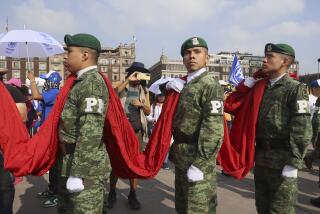Brazil’s Major Cities to Pick Mayors This Week
- Share via
SAO PAULO, Brazil — The restoration of democratic government in Brazil moves to the cities this week, with mayoral elections to be held in many of them.
On Friday, for the first time since the military regime suspended political liberties in 1965, Sao Paulo, a huge state capital with more than 7 million inhabitants and 4.5 million registered voters, will elect a mayor. In the past, the Sao Paulo mayor’s office was a steppingstone to national office.
On the same day, there will be elections for mayor in 201 other cities, including all 25 state capitals. The number of eligible voters Friday is 18.5 million, a third of Brazil’s electorate.
By law, campaigning ended Tuesday, with massive rallies in Sao Paulo and Rio de Janeiro.
Traditionally, the urban vote in Brazil has been considered more leftist than the rural vote, and the military regimes that ruled here for two decades preferred to appoint mayors in the state capitals and other “national security” areas rather than allow free elections.
Test for Coalition
This will be the first electoral test for the coalition of political parties that ended 21 years of military rule in January by electing--by an electoral college--a civilian political leader, Tancredo Neves, as president.
Before he could take the oath, Neves, 78, died of an abdominal disorder, and his running mate, Jose Sarney, was sworn in as his replacement. In eight months as president, Sarney has consolidated his personal leadership of the coalition that elected Neves.
This coalition--Neves’ Brazilian Democratic Movement and the Liberal Front, the second largest party--gives Sarney a majority of seats in Congress, but the municipal elections have caused deep fissures in the alliance.
Also, the municipal elections could strengthen the political challenge to Sarney that is being mounted by Gov. Leonel Brizola of Rio de Janeiro, who is probably the most dynamic populist leader in Brazil.
Mayoral Confrontation
Here in Sao Paulo, Brazil’s financial and industrial center, the mayoral contest has produced a confrontation between the Brazilian Democratic Movement and the Liberal Front.
The Democratic Movement candidate is Fernando Henrique Cardozo, 54, a “modern” politician who appeals to “progressive” urban voters. An internationally known sociologist who has taught at the Sorbonne in Paris, he was elected to the Senate in 1982 as a candidate strongly critical of the military regime.
But Cardozo is running against an Old Guard candidate, former President Janio Quadros, who is supported by the Liberal Front. Quadros, 68, is white-haired and his voice quavers, but he has attracted major support from older voters with a campaign emphasizing personal security and opposition to communism.
After an impressive term as mayor of Sao Paulo in 1954-56, Quadros was elected governor of the state. This was his route to the presidency at the head of a broad-based political movement that promised to end corruption, fight inflation and follow a “nationalist” foreign policy.
Eight months after a smashing electoral triumph, Quadros resigned, blaming “occult forces.” But he had taken on the Congress in a dispute he was bound to lose, because he lacked a majority.
Quadros Seeks Comeback
From this apparent eclipse in his personal career, which dealt democratic government a severe blow, Quadros is now trying to make a comeback. His candidacy is supported by leading Cabinet members representing the Liberal Front, and two of them--Foreign Minister Olavo E. Setubal and Minister of Mines and Energy Aureliano Chaves, both of whom have presidential aspirations--have publicly campaigned for Quadros.
If Quadros defeats Cardozo, the so-called democratic alliance of the Democratic Movement and the Liberal Front that sustains the Sarney government will be deeply shaken. There are elections for governor in all the states next year, and the alliance will be even further weakened, because the two parties will again be rivals.
The mayoral campaigns have been lively in all the major cities. In Sao Paulo, loudspeaker trucks move about blaring songs written for the major candidates. Campaign booths line the Viaducto do Cha, an overpass in the center of the financial district where 300,000 people pass by every day.
More to Read
Sign up for Essential California
The most important California stories and recommendations in your inbox every morning.
You may occasionally receive promotional content from the Los Angeles Times.













